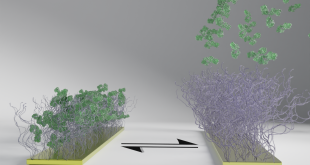Because they spoil without refrigeration, vaccines are notoriously difficult to transport to remote or dangerous places; as a result, millions of children around the world miss out on life-saving inoculations. However, scientists at the University of Bath have found a way to prevent warmed-up vaccines from degrading. By encasing protein molecules in a silica shell, the structure remains intact even when heated to 100°C, or stored at room temperature for up to three years.
The technique for tailor-fitting a vaccine with a silica coat – known as ensilication – was developed by a Bath team in collaboration with the University of Newcastle. This pioneering technology was seen to work in the lab two years ago, and now it has demonstrated its effectiveness in the real world, too.
In a study published by Scientific Reports, the researchers sent both ensilicated and regular samples of the tetanus vaccine from Bath to Newcastle by mail (a journey time of over 300 miles, which takes a day or two). When doses of the ensilicated vaccine were subsequently injected into mice, an immune response was triggered, showing the vaccine to be active. No immune response was detected in mice injected with unprotected doses of the vaccine, indicating the medicine had been damaged in transit.
Dr. Asel Sartbaeva, who led the project from the University of Bath’s Department of Chemistry, says: “This is really exciting data because it shows us that ensilication preserves not just the structure of the vaccine proteins but also the function – the immunogenicity. This project has focused on tetanus; next, we will be working on developing a thermally-stable vaccine for diphtheria, and then pertussis. Eventually we want to create a silica cage for the whole DTP trivalent vaccine, so that every child in the world can be given DTP without having to rely on cold chain distribution.”
Dr. Sartbaeva estimates that ensilicated vaccines could be used for humans within five to 15 years. She hopes the technology to silica-wrap proteins will eventually be adopted to store and transport all childhood vaccines, as well as other protein-based products, such as antibodies and enzymes.
 BioLab Business Magazine Together, we reach farther into the Canadian Science community
BioLab Business Magazine Together, we reach farther into the Canadian Science community





